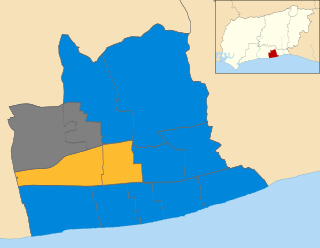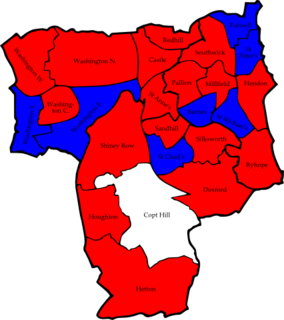The 2003 Worthing Borough Council election took place on 1 May 2003 to elect members of Worthing Borough Council in West Sussex, England. One third of the council was up for election and the Liberal Democrats lost overall control of the council to no overall control. [1] Overall turnout was 28.61%. [2]

Worthing is a large seaside town in England, and district with borough status in West Sussex. It is situated at the foot of the South Downs, 10 miles (16 km) west of Brighton, and 18 miles (29 km) east of the county town of Chichester. With an estimated population of 104,600 and an area of 12.5 square miles (32.37 km2) the borough is the second largest component of the Brighton/Worthing/Littlehampton conurbation, which makes it part of the 15th most populous urban area in the United Kingdom. Since 2010 northern parts of the borough, including the Worthing Downland Estate, have formed part of the South Downs National Park.

West Sussex is a county in the south of England, bordering East Sussex to the east, Hampshire to the west and Surrey to the north, and to the south the English Channel.

England is a country that is part of the United Kingdom. It shares land borders with Wales to the west and Scotland to the north-northwest. The Irish Sea lies west of England and the Celtic Sea lies to the southwest. England is separated from continental Europe by the North Sea to the east and the English Channel to the south. The country covers five-eighths of the island of Great Britain, which lies in the North Atlantic, and includes over 100 smaller islands, such as the Isles of Scilly and the Isle of Wight.
Contents
The election saw 38 candidates from 4 parties competing for the 13 seats which were being contested. [3] 7 sitting councillors stood down at the election which saw the Liberal Democrats attempting to defend the majority they had won in the previous election in 2002. [3] The Liberal Democrats campaigned on the record of their "Clean and Safe Worthing" campaign and on plans to upgrade the leisure centre and replace the Aquarena. [3] However the Conservatives attacked them for stopping improvements to the seafront and for the poor state of facilities in Worthing. [3] The Green and Labour parties also stood candidates but did not contest all of the wards with Labour only putting up 3 candidates. [3]
A Councillor is a member of a local government council.

The Green Party of England and Wales is a green, left-wing political party in England and Wales. Headquartered in London, since September 2018, its Co-Leaders are Siân Berry and Jonathan Bartley. The Green Party has one Member of Parliament in the House of Commons, one representative in the House of Lords, and three Members of the European Parliament. It has various councillors in UK local government and two members of the London Assembly.
The Labour Party is a centre-left political party in the United Kingdom which has been described as an alliance of social democrats, democratic socialists and trade unionists. The party's platform emphasises greater state intervention, social justice and strengthening workers' rights. Labour is a full member of the Party of European Socialists and Progressive Alliance, and holds observer status in the Socialist International. As of 2017, the party was considered the "largest party in Western Europe" in terms of party membership, with more than half a million members.
The results saw the Conservatives make one gain from the Liberal Democrats in Selden ward, [4] with the winner, Jack Saheid, becoming the first Muslim councillor on Worthing council. [5] After the Liberal Democrats failed by 6 votes to gain Gaisford from the Conservatives, both parties ended the election on 18 seats making Worthing a hung council. [5] The results meant that the Liberal Democrat mayor of Worthing had the casting vote on the council. [6]
A casting vote is a vote that someone may exercise to resolve a deadlock. A casting vote is typically by the presiding officer of a council, legislative body, committee, etc., and may only be exercised to break a deadlock. Examples of officers who hold casting votes are the Speaker of the British House of Commons and the President of the United States Senate.
After the election, the composition of the council was
- Conservative 18
- Liberal Democrat 18 [7]










